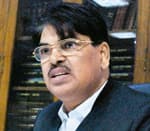Limit the number of Law schools to improve quality
Q. What are the problems that Bar Council of India is facing, related to legal education?

A. If an institution comes with the report of a university that it is fit, the state government has already issued the NOC and our inspecting team goes there and finds that the institution has all the requisite infrastructure, adequate number of faculty, etc., then we do not have any option but to approve it.
However, it is alarming that day-by-day Law institutions are mushrooming in the country and now we have decided to ask state governments to limit the number of institutions as per the population in that state and as per their demand and requirement. Only then can we improve the quality of legal education in the country.
Q. What is your take on the recent tussle between Delhi University and the Bar Council related to the former’s affiliation?
A. We have been finding problems with Delhi University’s Law Department, even the students were regularly complaining about lack of infrastructure. Over 2,500 students were admitted, without any approval from the BCI. Classes were being conducted for only three hours, while as per the BCI rules it should be at least five hours per day, and two to three sessions was going on, all against BCI norms. Most of the Law faculties were on contract, that too for one or two years.
|
We issued a notice to Delhi University and we found that they were not interested in getting it approved. Moreover, DU was continuously violating rules and this forced us to take that step against the university. Now, things are all right and we inspected the university and the team submitted its report to the Legal Education Committee of the BCI. The Committee has accepted the report and the University has been put under certain conditions and if they do not fulfil it from the next year, we will have to again take a call on that.
Q. What steps are being taken against institutions running from single rooms in the name of imparting Law degrees and churning out unskilled professionals?
A. Whenever we get such information from our inspection team we take necessary action. In these aspects now BCI is very strict because the Legal Education Committee is very strong; it has a former Supreme Court judge, sitting Chief Justice and several sitting judges and Vice Chancellors of several National Law Universities. BCI will never tolerate any mediocre player coming to destroy the country’s legal education.
Q. The previous government came up with the Bill to establish NCHER, which would have limited or subsumed the role of the Bar Council. Do you think this government will come up with same Bill?
A. The NCHER was really a bad idea and the previous government wanted to usurp all the powers of the regulators, be it the UGC, AICTE, BCI, MCI and we opposed it. I do not think that this government will bring in such a Bill.
List of colleges accepting exam
Browse Law Colleges by State
Applications for Admissions are open.
Moot Court | Mock trials | Legal Aid Clinic
Amity University-Noida Law Admissions 2026
ApplyAmong top 100 Universities Globally in the Times Higher Education (THE) Interdisciplinary Science Rankings 2026
SRM University, Chennai LLM 2026
ApplyNAAC A++ Accredited | Ranked #11 by NIRF
SRM University, Chennai Law UG 2026
ApplyNAAC A++ Accredited | Ranked #11 by NIRF
Chandigarh University Admissions 2026
ApplyNAAC A+ Accredited | Among top 2% Universities Globally (QS World University Rankings 2026)
VIT Chennai Law Admissions 2026
Apply#14 in India by NIRF Ranking | NAAC A++ accredited | Approved by BCI | Scholarships Available
 It is alarming that day-by-day law institutions are mushrooming in the country and now we have decided to ask state governments to limit the number of institutions as per the population in that state and as per their demand and requirement. Only then can we improve the quality of legal education in the country
It is alarming that day-by-day law institutions are mushrooming in the country and now we have decided to ask state governments to limit the number of institutions as per the population in that state and as per their demand and requirement. Only then can we improve the quality of legal education in the country